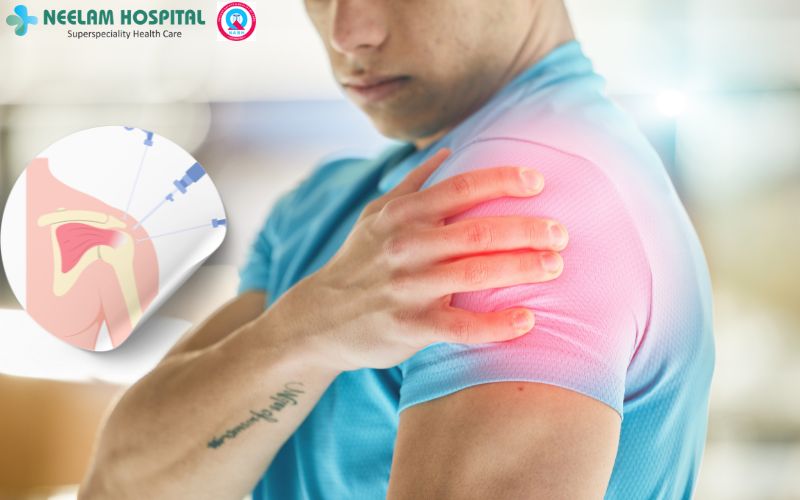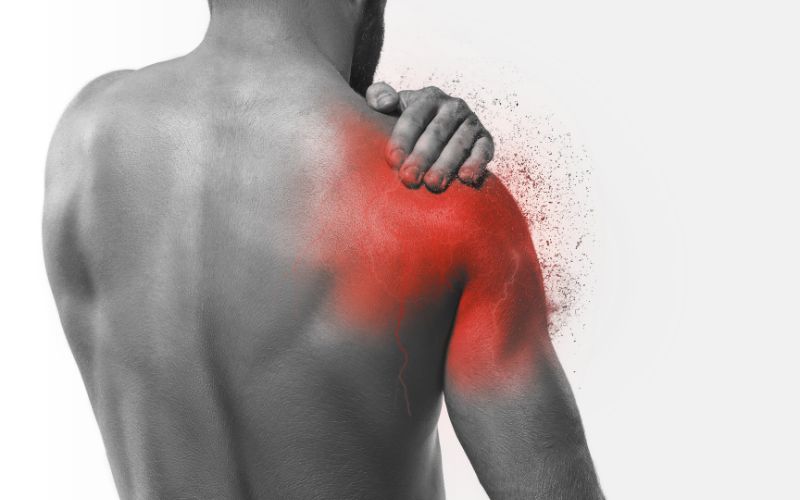
Welcome to Neelam Hospital, your trusted destination for comprehensive healthcare services in Punjab. Our multispeciality hospital in Punjab is renowned for its state-of-the-art facilities, expert medical professionals, and patient-centric approach. One of our flagship services is shoulder arthroscopy surgery, where we leverage cutting-edge technology and advanced techniques to ensure optimal outcomes for our patients.
Shoulder arthroscopy is a minimally invasive surgical procedure used to diagnose and treat various shoulder joint conditions. This technique involves inserting a small camera, called an arthroscope, into the shoulder joint through a tiny incision. The camera provides a clear view of the inside of the joint, allowing the surgeon to guide miniature surgical instruments to repair damaged tissues.

The shoulder joint is a complex and highly mobile structure comprising bones, muscles, tendons, and ligaments. It allows a wide range of movements, making it susceptible to injuries. The joint’s stability depends on the coordination of its components, including the clavicle, scapula, and humerus, along with the surrounding muscles and tendons. Understanding this intricate structure is crucial for diagnosing and treating shoulder conditions effectively.
Shoulder arthroscopy is used to treat a variety of conditions, including:
Shoulder injuries and conditions can result from overuse, trauma, or degenerative changes. Common issues include rotator cuff tears, shoulder impingement syndrome, labral tears, and frozen shoulder. These conditions can cause pain, restricted movement, and reduced quality of life. Proper diagnosis and timely intervention are essential for effective management and recovery.
Detailed Consultation: Our surgeons conduct thorough consultations to understand your medical history and symptoms.
Diagnostic Imaging: Advanced imaging techniques, such as MRI and X-rays, are used to assess the condition of the shoulder.
Preoperative Instructions: You will receive specific instructions on how to prepare for the surgery, including fasting and medication guidelines.

Anesthesia: The procedure is typically performed under general anesthesia, ensuring you remain comfortable and pain-free.
Incision and Arthroscope Insertion: Small incisions are made to insert the arthroscope and surgical instruments.
Real-Time Visualization: The arthroscope transmits real-time images to a monitor, allowing the surgeon to navigate and repair the shoulder joint accurately.
Repair and Closure: Depending on the condition, the surgeon may remove or repair damaged tissues, followed by suturing the incisions.
Recovery Room: You will be monitored in the recovery room until the effects of anesthesia wear off.
Pain Management: Medications will be prescribed to manage pain and discomfort.
Follow-Up Appointments: Regular follow-up appointments will be scheduled to monitor your progress and remove stitches if necessary.
Rehabilitation: A customized rehabilitation program will be designed to aid in your recovery and restore shoulder function.
While shoulder arthroscopy is generally safe, it can have potential risks such as infections, bleeding, and complications related to anesthesia. Nerve or blood vessel damage and stiffness are rare but possible. Being aware of these risks helps in making an informed decision and preparing adequately for surgery and recovery.
Effective management and mitigation of complications involve thorough preoperative assessment, adherence to surgical protocols, and diligent postoperative care. At Neelam Hospital, our team is committed to minimizing risks through meticulous planning and patient education. Post-surgery follow-ups and a tailored rehabilitation program are crucial to ensure optimal recovery and address any arising issues promptly.
Minimally Invasive: Smaller incisions result in reduced pain, less scarring, and quicker recovery compared to traditional open surgery.
Accurate Diagnosis: The high-definition visualization provided by the arthroscope allows for precise diagnosis and treatment.
Reduced Hospital Stay: Most patients can return home on the same day as the surgery.
Faster Recovery: The minimally invasive nature of the procedure promotes faster healing and rehabilitation.
Follow Rehabilitation Plan: Adhere strictly to the rehabilitation program designed by your physiotherapist to regain strength and mobility.
Pain Management: Take prescribed pain medications as directed to manage discomfort effectively.
Avoid Strenuous Activities: Refrain from heavy lifting and strenuous activities until cleared by your doctor.
Maintain Follow-Up Appointments: Regular check-ups are crucial to monitor progress and address any concerns promptly.
Stay Hydrated and Eat Healthily: Proper nutrition and hydration support the healing process.
If you are experiencing shoulder pain or have been advised to undergo shoulder arthroscopy, don’t hesitate to contact Neelam Hospital. Our team is here to provide you with the best possible care and support throughout your treatment journey.
Shoulder arthroscopy is used to diagnose and treat various shoulder conditions, including rotator cuff tears, shoulder impingement syndrome, labral tears, frozen shoulder, shoulder instability, arthritis, and biceps tendonitis.
Recovery time varies depending on the individual and the specific procedure performed. Generally, patients can expect to return to light activities within a few weeks, with full recovery taking several months, especially with a comprehensive rehabilitation program.
While some discomfort is expected after the procedure, pain is typically managed effectively with medications and a well-planned pain management strategy.
Yes, shoulder arthroscopy is usually an outpatient procedure, meaning most patients can go home the same day.
As with any surgical procedure, there are risks involved, including infection, bleeding, and reactions to anesthesia. However, these risks are minimal, and complications are rare.

